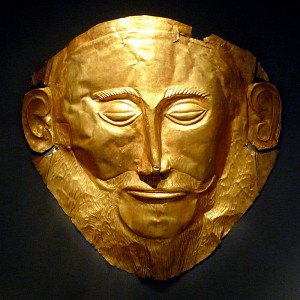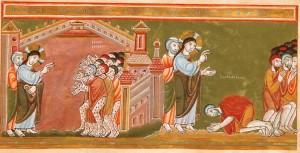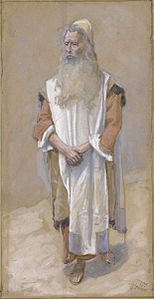I had occasion last Sunday to reflect again on the well-known Gospel passage in which Jesus heals ten lepers but only one, a Samaritan, comes back to thank Him. It is always a pleasure to preach on ultra-famous Gospels because the preacher has the pleasure of revealing to himself and the congregation that the Gospel has never really been heard at all. Here is what I said:
Jesus has a question for us, and it’s a hard question: “Were not all ten cleansed? Where are the other nine?” (Luke 17)
All ten lepers were sick. All ten asked for Jesus to heal them. And all ten were healed. But only one, one out of ten, returned, “glorifying God in a loud voice”; “… and he fell at the feet of Jesus and thanked him.”
That one was the only one to be healed completely.
Because he was healed not only in body but in soul, too. The proof of that is his joy.
And how odd it is, and how ironic, that as the Gospel takes pains to tell us, this one righteous man was not part of the Jewish community at all. He was a foreigner; a Samaritan.
Now why are we talking about lepers in church on a nice Sunday morning?
Leprosy is a foul skin disease, and it still exists in warmer countries. But leprosy also has a powerful symbolic value. It means something in the Gospel; it shows us something about ourselves. Because the disease of leprosy is highly contagious. And people who had it were expelled from their homes and shut out of the gates of their towns. That is why we have this roaming band of ten lepers today: they huddled together to survive. They were isolated from the rest of the world because of the fear of infection: that their disease would spread.

Gebhard Fugel, Christus und die Aussätzigen, c. 1920. wikimedia.org
A good old priest would tell you: The situation of the lepers illustrates what it means to be a sinner. Leprosy is like sin. Lepers were considered unclean: I as a sinner am unclean. Lepers were excluded from society for fear of infection: I as a sinner can infect others with my sin. Because we know that no one is ever a sinner in private. My sin always has a toxic and poisonous effect on others, especially on my nearest and dearest. Even if the sin itself is secret. I poison the air.
No sin is private.
Now some people who have become totally accustomed to sin are in an even worse state than the lepers in today’s Gospel. Because at least these lepers knew they were sick and asked for healing. Some sinners have ceased to care about getting healthy. They seem not to care about salvation. And if you ask them, they might even deny the basic fact that they are sick.
I hope that’s not our situation here today. It wasn’t the case of the lepers, because they cried out to be healed. So let’s focus on those sinners who seek the Lord Jesus and want His forgiveness of sins – and actually receive that forgiveness.
Today’s Gospel shows us that you can obtain forgiveness of sins from the Lord and yet not be healed completely. Nine of those who were healed enjoyed their cleansing in a purely selfish way. It was enough to them that they returned to health.
They were totally uninterested in Jesus and the community gathered around Jesus, which was the early Church.
Well, sometimes we just behave like the nine ungrateful lepers. We come to confession, we go on to Holy Communion, but we only want to obtain the forgiveness of sins, or find strength in the midst of our difficulties. Our faith is sort of like a self-improvement program or a yoga routine: it has practical benefits for us. We like it like that. That’s fine, but what about Jesus? Jesus himself might not be so important to us. We don’t want to love Him in a way that costs us; we aren’t interested in learning to love him or helping others to find Him. But love always costs. And love is always shared with others. That’s what love is. And a yoga program or a health kick, nice as it may be, is not real love.
If we have died with him
we shall also live with him;
if we persevere
we shall also reign with him.
But if we deny him
he will deny us.
That’s what Saint Paul said today (2 Tm 2).
Only the tenth leper, the foreigner, the Samaritan, allowed the Lord Jesus to heal him completely. He went back to him and to the community gathered around him in a spirit of real gratitude. It is very significant that so often foreigners, people who do not belong visibly to the community of God’s people, deserve the highest praise of the Lord Jesus Himself: recall the parable of the Good Samaritan or the words of the praise that Jesus spoke about the faith of the Roman centurion or the Canaanite woman. All foreigners. All people who had hard lives. And all – all of them – were moral heroes. Examples to the rest of us.
And that is the good news of today’s Gospel. Sin spreads like leprosy. There is no private sin, because the choice to reject God is contagious. It can infect others. It can spoil a whole society. But virtue and grace and holiness, the choice for God and for goodness that starts in the silence and darkness of my heart: that is also contagious. That also spreads. Holiness: personal holiness, personal sanctity, can lift a whole family up. It can lift a whole church up. It can enlighten the world.
Now there are a lot of woes and trials in the world right now. A lot is wrong in our country or in our city. But the challenge of the Gospel today is not to look at those things and say, “Oh, it’s the president, or the governor, or the mayor. He should have done a better job.” We don’t look at our moral sufferings, at our malaise, and say, “Oh, this is the result of the market forces of late-stage capitalism” – in other words, it’s not my fault.
Instead we look within. Because if we want a beautiful society and a healthy society and a holy society, each one of us has to start the battle for holiness in his own heart. And that is not about some kind of superhuman effort to obtain salvation on my own, it’s not about squeezing and pushing and trying real hard. It’s about quieting down, listening for the Lord’s voice, opening the window of my heart and praying for Him, waiting for Him, to come in and start healing. That’s where holiness begins: with God’s initiative.
There is no way to wiggle out of holiness. And if we are not holy, if we are not morally excellent, if we are not lords and ladies in the palace of the King, then our families and our city and our society will not be noble. It won’t be a healthy place to live.
***
It’s so easy to complain and groan and decry the situation we’re in. It’s easy to be what they call a prophet of doom. It’s easy to be a Cassandra.

Cassandra by Evelyn De Morgan (1898, London); Cassandra is in front of the burning city of Troy, at the peak of her insanity. Wikipedia.
Do you remember Cassandra? She’s a figure in pagan myth. She appears in the works of Homer and in plays by Aeschylus.
Cassandra, was supposed to be very beautiful. She was the daughter of King Priam and Queen Hecuba of Troy. But she fell foul of one of the pagan gods, so the legend goes, and she was cursed. She would foresee the future and foretell the future and what she said would be totally true, but the curse was that no one would ever believe her. And so Cassandra foretold the collapse of her city, Troy, and the people of the city ignored her. Until it was too late.
A Cassandra has no hope. A Cassandra is a pitiful and sad and tragic figure.
At the end of her life, in a work by Aeschylus (Ἀγαμέμνων/Agamemnon 1072 and following), Cassandra declares that she is resigned to die.

The Mask of Agamemnon which was discovered by Heinrich Schliemann in 1876 at Mycenae, now believed to pre-date the legendary Trojan War by 300 years. Wikipedia.
Everyone else in her native city has perished, and it is time for her to join them. She goes into the palace, into “a room that reeks with blood like a slaughter house” (1309). And she is ready to do herself in. She says:
“One thing left. I want to sing my own dirge. I pray to the sun, to this last minute of life: let my enemies pay with blood for what they did to me—I’m just a killed slave, easy fistful of death. But you, o humans, o human things—when a man is happy, a shadow could overturn it. When life goes wrong, a wet sponge erases the whole picture. You, you, I pity.”
No hope, only blackness.
No light, only the darkness of the absurd.
Our situation is bad and it’s only getting worse. Happiness is a mad delusion.
And at the end of it all, death. That’s Cassandra. That’s the pagan prophet.
That’s the prophet of doom.
Prophecy was a burden for Cassandra. And her bad experience with prophecy is typical of Greek tragedy, wherein the prophetic gift is usually more a curse than a blessing.
That’s not true for us. That’s not true for us followers of Christ. That’s not true in the Bible — in the Hebrew, not the Greek, world.
Because biblical prophecy, though dire, is always full of hope.
There is hope at the root, there is love at the root. And love is always shared. Love transforms societies. Biblical prophecy is fertile, never despairing. Because the Greeks lacked something that the Hebrew Bible has in unique measure: a passion for justice for the poor, the weak, and the despised.
In pagan religions, the pure man is stoical. He feels nothing because he’s above it all. He can step over a beggar without remorse.
But not in the Bible.
Moses and Jeremiah consider justice and compassion to be the ultimate sign of any true holiness. One cannot claim to love God and not be passionate about justice. That is the primary Biblical, Hebrew, contribution to the human spirit.
Listen to the words of a real prophet, to Moses in the book of Deuteronomy:
Judges and officers shalt thou make thee in all thy gates… and they shall judge the people with just judgment. … Justice, justice shall you pursue.… that thou mayest live, and inherit the land which the LORD thy God giveth thee.
The prophet says in Hebrew: צֶדֶק צֶדֶק תִּרְדּף
Tzedek, tzedek tirdof.
Justice, justice shall you pursue!
And the book of Proverbs echoes: “To do what is right and just is more acceptable to the Lord than sacrifice.” (Proverbs 21:3)
Justice, justice shall you pursue.
In other words, fight.
In other words, reach.
Come to Jesus, ask him for healing. And you will obtain it. But then show yourself to be a noble man. Be a noble woman. Have the grace and the virtue to come back to Jesus singing the praises of God. Come back to thank him. Fall at his feet. Come to the foot of this altar of the Blessed Sacrament, which we are about to receive. And ask him to take you in.
Because if you want justice in this world, justice for the poor and weak, healing for lepers and sinners, you have to be holy. You have to be whole; healed. And you start by breaking away from the pack. You leave the nine other lepers behind, even though you’re a foreigner, and you do what is right. No matter what others are doing. You strive for holiness.
We can pray with the words of the poet Wordsworth from 200 years ago:
… O, let my weakness have an end!
Give unto me, made lowly wise,
The spirit of self-sacrifice;
The confidence of reason give;
And in the light of truth thy bondman let me live! (Ode to Duty, 1805)
And when the nine other lepers stand around you and ask, how does it feel to be going against the trend? How does it feel to be separating yourself from the group, from the herd? How does it feel to be different? Then you can say, and you will say: I feel like a diamond in a bucket of sh…
And so you shall be: a jewel of excellent quality no matter your surroundings. Because you have chosen Jesus and allowed Him to make you holy.
Then Jesus will say to you, poor leper, as he said to the leper in the Gospel here today: “Stand up!” — you there — “Stand up and go; your faith has saved you.”
And you will rise up, fully healed, and go.















Comments - No Responses to “The grateful leper”
Sorry but comments are closed at this time.